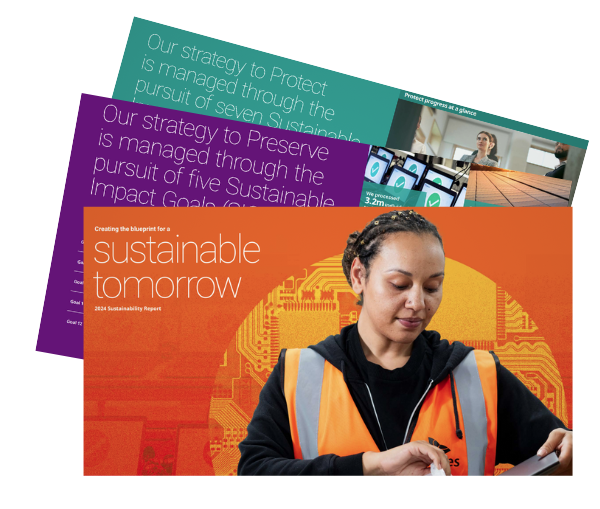As the demand for meaningful corporate climate action accelerates, science-based targets (SBTs) have become a cornerstone of sustainable business strategy. These targets align greenhouse gas reduction goals with the latest climate science and demonstrate genuine commitment to decarbonization. In this blog, we break down what science-based targets are, why they matter for your organization, and how industry leaders like SK Tes use them to drive transparent, future-focused sustainability programs.
Contents of the blog
- What Are Science-Based Targets?
- The Importance of a Net Zero Strategy
- Understanding Scope 1, 2, and 3 GHG Emissions
- Why are Scope 3 Emissions Important?
- SK Tes' commits to ESG targets including supply chain emission management
- Our Science-Based Targets Explained
- Building Trust and Credibility Through Transparency
- Our Path Forward
1. What Are Science-Based Targets?
In corporate sustainability, science-based targets (SBTs) are a defining framework. These targets align a company’s greenhouse gas (GHG) reduction efforts with the level of decarbonization required to limit global warming to well below 2°C above pre-industrial levels, as described by the Paris Agreement. By setting science-based targets, companies assure that their climate actions are in line with the latest climate science, providing a clear path toward a sustainable future.
The Science Based Targets initiative (SBTi) is a collaborative effort between CDP, the United Nations Global Compact, World Resources Institute (WRI), and the World Wide Fund for Nature (WWF). The initiative independently assesses and validates companies' targets, ensuring that they are robust and scientifically grounded.
2. The Importance of a Net Zero Strategy
Achieving a net-zero strategy is essential for mitigating climate change and ensuring long-term business viability. A net-zero strategy involves balancing the amount of GHG emissions produced and removed from the atmosphere.
For businesses, it is not just about compliance, it’s about staying relevant in a rapidly evolving market where consumers and stakeholders increasingly prioritize sustainability. Companies that commit to, and achieve net-zero targets can gain a significant competitive advantage, demonstrating their leadership in sustainability and their commitment to taking climate action.
3. Understanding Scope 1, 2, and 3 GHG Emissions
Understanding the three types of GHG emissions, as defined in the Greenhouse Gas Protocol, is fundamental to setting and achieving science-based targets:
-
Scope 1: Direct emissions from owned or controlled sources, such as company vehicles and on-site fuel combustion.
-
Scope 2: Indirect emissions from the generation of purchased electricity, steam, heating, and cooling consumed by the reporting company.
-
Scope 3: All other indirect emissions that occur in the company's value chain, including both upstream and downstream emissions. This encompasses everything from raw material extraction to product use and disposal.

4. Why are Scope 3 Emissions Important?
Scope 3 emissions often represent the largest portion of a company’s total GHG emissions. Addressing these emissions is crucial for any comprehensive climate strategy. However, setting targets for Scope 3 emissions is a significant undertaking due to the complexity and breadth of the value chain.
By addressing Scope 3 emissions, companies can drive significant reductions in global GHG emissions and influence positive change across their entire supply chain. This holistic approach is necessary for achieving meaningful climate action and aligns with global sustainability goals.
5. SK Tes' commits to decarbonization targets including supply chain emission management
At SK Tes, we are committed to going beyond resource conservation. In our most recent Sustainability Report Chief Executive Officer Jae Cho states, “We recognize the need to go beyond resource conservation and actively decarbonize our operations and supply chain.” This commitment is reflected in our validated science-based targets for SK Tes' Scope 1, 2, and 3 emissions.
Setting science-based targets is a rigorous process designed to ensure credibility and transparency. We began the journey by registering with the SBTi, publicly declaring our commitment to align with their standards. The SK Tes Sustainability Team then worked with the business to develop emissions reduction targets following SBTi's criteria and guidance and submitted the goals for validation. Our targets were validated and accepted by SBTi.
SK Tes will disclose our annual progress and greenhouse gas emissions to demonstrate accountability. Alongside 10,000 global businesses, SK Tes is recognized as "committed" to achieving net zero by the SBTi, CDP, UN Global Compact and We Mean Business.
6. SK Tes Science-Based Decarbonization Targets Explained
SK Tes has pledged to achieve net-zero greenhouse gas emissions across our entire value chain by 2050. As part of our near-term objectives, we aim to:
- Reduce absolute Scope 1 and 2 emissions by 42% by 2030, using 2023 as our baseline
- Target 51.6% reduction per USD value added in Scope 3 emissions from key areas such as purchased goods and services, capital goods, energy-related activities, upstream transportation, and operational waste within the same timeframe.
- Looking longer term, our goal is to cut absolute Scope 1, 2, and 3 emissions by 90% by 2050
Download our Sustainability Report
At SK Tes, we are dedicated to creating meaningful, long-term impact by safely and sustainably repurposing one billion kilograms of technology assets by 2030 and more....

7. Building Trust and Credibility Through Transparency
SK Tes is making public commitments and plans to achieve our goals which are aligned with rigorous, globally-recognized standards. We believe that this transparency is crucial for building trust and credibility with our customers. By publicly committing to science-based targets and having them validated, we demonstrate our dedication to genuine sustainability action.
Our annual sustainability report demonstrates our commitment to transparency, highlighting the measurable impact of our actions and our progress toward our sustainability goals. This report is an essential tool for communicating our efforts and achievements to our customers and stakeholders.
8. SK Tes Path Forward for Achieving Net Zero Strategy
Science-based targets are vital for achieving a net-zero strategy and ensuring long-term business sustainability. At SK Tes, we are proud to have our targets validated for Scope 1, 2, and 3 emissions, reflecting our commitment to comprehensive climate action. By aligning with customer values, building trust through transparency, and leveraging our competitive advantage in sustainability, we are leading the charge toward a sustainable future.
For more on our sustainability initiatives and updates, be sure to check out other SK Tes blog posts and information about our Sustaining Tomorrow commitment on our website.



.jpg?length=300&name=Community-based%20social%20initiatvies%20by%20SK%20Tes%20(featured).jpg)
